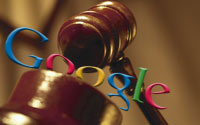Doctor Withdraws Lawsuit About Google's Autocomplete Suggestions
- by Wendy Davis @wendyndavis, April 5, 2013

An Australian doctor has quietly withdrawn a lawsuit accusing Google of defaming him with the auto-complete feature. Cancer surgeon Guy Hingston of New South Wales filed the notice of withdrawal last month in U.S. District Court for the Central District of California. The court papers don't say why he decided not to pursue the case; the withdrawal was without prejudice, meaning that he potentially can bring the lawsuit again in the future.
Hingston said in his original lawsuit that Google automatically suggests the phrase "Guy Hingston bankrupt" when users start typing his name into the query box. He said he was not “bankrupt,” and that Google's results cost him patients, as well as financial backers.
But Hingston was listed in court records as a creditor of Eclipse Aviation, which filed for bankruptcy in federal court in Delaware. The search results associated with the phrase "Guy Hingston bankruptcy" take users to articles about Eclipse Aviation. Given that he appears to have been involved in a bankruptcy, legal experts predicted that he would face an uphill battle in court.
Google and Hingston's lawyers did not respond to Online Media Daily's questions about the matter. As of Friday, the phrase “Guy Hingston bankruptcy” still appears as a suggestion after people type “Guy Hingston” into Google's query box.
Hingston withdrew his lawsuit the same week in March that a federal appeals court threw out a separate case against Google stemming from its autocomplete feature. In that matter, the 7th Circuit Court of Appeals rejected Wisconsin resident Bev Stayart's claim that Google's autocomplete wrongly associated her name with the drug Levitra.
Stayart argued that Google was violating a Wisconsin privacy law, but the 7th Circuit disagreed that the law applied to Google's search results in that case. Among other reasons, the appeals court ruled that any association between the word “Levitra” and Stayart's name was newsworthy given that she previously sued Yahoo for connecting her name to the drug.
Santa Clara University law professor Eric Goldman says Hingston's case was “never meritorious,” for several reasons. Among others, Hingston's argument relies on unsupported assumptions about the conclusions consumers reach from Google's suggested search terms, Goldman says.
He adds that the case “became even more clearly doomed” after the 7th Circuit ruled in Google's favor in the Stayart case.
Google is facing other lawsuits about its autocomplete feature in Europe. In one matter, Bettina Wulff -- the wife of former German president Christian
Wulff -- sued Google for allegedly showing the phrases "Bettina Wulff prostitute" and "Bettina Wulff escort" when people began typing her name into the query box.


